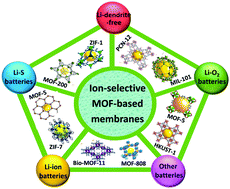The potential of electrolyte filled MOF membranes as ionic sieves in rechargeable batteries
Abstract
Metal–organic frameworks (MOFs), also known as porous coordination polymers, are constructed using metal-containing nodes with organic bridges. With intrinsically ordered porous structure, MOFs are considered as a promising component to modify separator/electrolyte systems for rechargeable batteries. Herein, drawing upon the information collected from recent reports, we analysed and discussed the effects of MOF-based membranes on ion transmission. Both simulation calculations and experimental results indicated that the liquid electrolyte filled MOF membranes could aid in guiding the uniformity of Li ion plating, suppressing the growth of Li dendrites. More importantly, the applications of MOF-based membranes in Li–metal battery and Li-ion battery systems were also overviewed by collecting state-of-art research results. When the MOF-based membranes were used as separators, they can not only successfully restrain the adverse shuttling of electrochemical intermediate products for achieving long cycle life Li–S batteries, but can also be used to develop dual-mediator strategies for superior electrochemical performance Li–O2 batteries and hybrid electrolyte systems for high voltage Li-ion batteries. In addition, based on the obtained progress in rechargeable lithium batteries, the potential of MOF-based membranes serving as ionic sieves in Na–metal batteries, organic redox flow batteries and liquid-anode batteries was rationally proposed. Finally, several suggestions in regard to constructing reliable batteries with MOF membranes were provided from the perspective of practical applications.



 Please wait while we load your content...
Please wait while we load your content...